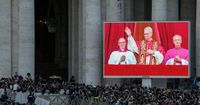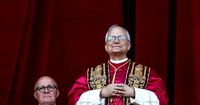In a historic moment for the Catholic Church, Cardinal Robert Francis Prevost was elected as Pope Leo XIV on May 8, 2025, becoming the first pope from the United States. This landmark event has drawn significant attention not only for its religious implications but also for its potential political ramifications, especially considering the new pope's past criticisms of prominent American political figures, including President Donald Trump and Vice President JD Vance.
Prior to his election, Prevost was active on social media, where he shared numerous posts that criticized the Trump administration's policies, particularly regarding immigration. In February 2025, he reposted an article titled "JD Vance is wrong: Jesus doesn’t ask us to rank our love for others," which rebutted Vance's interpretation of Catholic doctrine used to justify the administration's immigration policies. Vance, who converted to Catholicism in 2019, had argued that Christians should prioritize love for their family before extending it to the rest of the world. This stance was met with sharp criticism from Prevost, who emphasized that Jesus's teachings do not support such hierarchies of love.
The Vatican confirmed on May 8 that Prevost's social media account was authentic, marking a significant moment as the new pope’s online footprint was scrutinized just minutes after his election. His last post before ascending to the papacy was a poignant critique of the Trump administration's deportation policies regarding a Maryland resident, Kilmar Abrego Garcia, who had been wrongfully deported to El Salvador. Prevost shared a comment questioning, "Is your conscience not disturbed?" highlighting the moral implications of such policies.
Vance, who met with Pope Francis shortly before the latter's death, congratulated Prevost on becoming pope, expressing hope for his leadership. "May God bless him!" Vance wrote on X, the social media platform formerly known as Twitter. Trump also extended his congratulations, calling the election of the first American pope a "great honor for our country." However, the president's recent posting of an AI-generated image of himself dressed as a pope during a period of mourning for Pope Francis raised eyebrows and was criticized as a form of political interference.
Prevost's social media history reveals a consistent pattern of advocacy for immigrant rights and criticisms of gun violence. In 2017, he shared a post from Senator Chris Murphy urging action on gun control in the wake of the Las Vegas mass shooting, stating, "Your cowardice to act cannot be whitewashed by thoughts and prayers." Furthermore, he expressed support for the DACA program, defending Dreamers—young immigrants brought to the U.S. illegally as children.
As the new pope, Leo XIV is expected to carry forward the legacy of Pope Francis, who was known for his advocacy for the marginalized and his critiques of the Trump administration's immigration policies. The late pope had often referred to the deportation of migrants as a disgrace, emphasizing the need for compassion and understanding in addressing the plight of those seeking refuge.
In the wake of Prevost's election, reactions from conservative circles have been mixed. Some, like Laura Loomer, a far-right commentator, have labeled him a "Marxist puppet in the Vatican," while others, such as conservative commentator Charlie Kirk, have expressed a more neutral stance, acknowledging his pro-life views while questioning his positions on immigration and social justice.
Despite the criticisms, several prominent political figures, including former President George W. Bush and President Joe Biden, have expressed support for the new pope. Bush described the election as a "historic and hopeful moment for Catholics in America and for the faithful around the world," while Biden congratulated Prevost, wishing him success in his new role.
Prevost's election as pope comes at a time when the Catholic Church faces numerous challenges, including a growing divide within its ranks over social issues and the need to address the concerns of younger generations. His past social media activity suggests that he may approach these issues with a progressive lens, potentially aligning with the views of many American Catholics who advocate for a more inclusive and compassionate church.
As Pope Leo XIV, Prevost inherits a complex legacy and a divided church, and how he navigates the intersection of faith and politics will be closely watched in the coming years. His unique background as the first American pope, combined with his previous critiques of American political leaders, sets the stage for an intriguing papacy that may redefine the relationship between the Vatican and U.S. politics.
In conclusion, as the Catholic Church embarks on this new chapter under the leadership of Pope Leo XIV, the implications of his election resonate far beyond the religious sphere, potentially influencing the political landscape in the United States and beyond.





